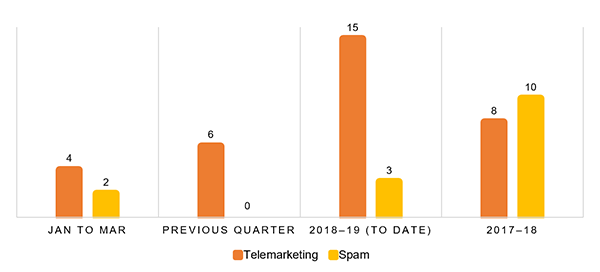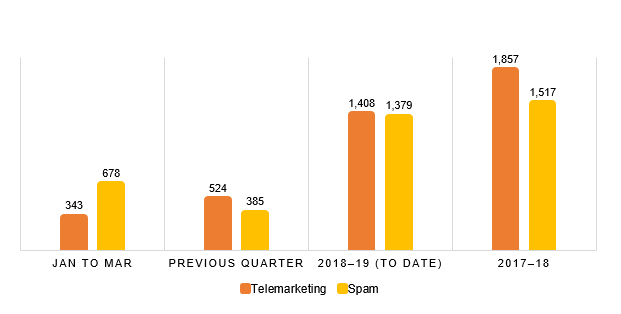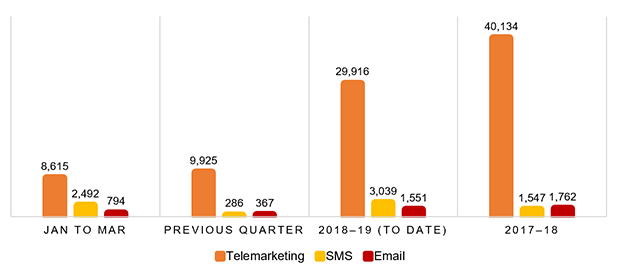 Combating scams discussion paper released
Combating scams discussion paper released
 Formal warnings issued to 2 businesses
Formal warnings issued to 2 businesses
 6 investigations were finalised and 7 were commenced
6 investigations were finalised and 7 were commenced
 1,021 contacts with businesses about compliance
1,021 contacts with businesses about compliance
 $378,000 paid infringement notices to date this financial year
$378,000 paid infringement notices to date this financial year
The ACMA enforces consumer safeguards for telemarketing and commercial electronic messages (spam). We provide the Do Not Call Register (DNCR), promote responsible industry practice and monitor compliance and enforcement.
Approach
Our activities depend on the risk of harm and impact on consumers. We:
- provide compliance information to industry
- contact businesses to warn them to rectify their compliance issues
- investigate serious, ongoing and systemic non-compliance
- take enforcement action where warranted.
We rely on intelligence from a variety of sources, including complaints from members of the public, reports, industry feedback and information from international regulators. We also gather intelligence through ‘shadow-shopping’, where the ACMA acts as a consumer to check compliance with regulations.
We also use intelligence to target particular industry sectors or issues that require priority attention. In 2018–19, our focus is on solar telemarketing, financial services marketing and spam SMS.
Combating scams
Scam Technology Project
The ACMA is concerned about the social and economic impact of scams on Australians, particularly those in vulnerable circumstances.
The ACMA released its Scam Technology Project Terms of Reference on 13 March 2019, which is exploring practical technical solutions to address the proliferation of scam calls over Australian telecommunications networks.
A discussion paper, Combating scams, was released 29 March 2019. Submissions close on 10 May 2019.
The ACMA issues scam alerts on a regular basis, generally through its social media channels.
Enforcement
Enforcement action for breaches of unsolicited communications laws can include Federal Court-imposed civil penalties, ACMA-issued infringement notices, formal warnings and court-enforceable undertakings. Learn about our compliance and enforcement approach.
Enforcement outcomes in the quarter
| Organisation | Outcome | Details |
|---|---|---|
|
Ticketek Pty Ltd |
The business was given a formal warning for breaching section 16(1) of the Spam Act. |
The investigation was commenced following consumer complaints. The ACMA found that the business had sent marketing emails after consent had been withdrawn. The investigation uncovered that Ticketek had identified and rectified the issue before the ACMA intervened. |
|
PreLegal Pty Ltd |
The business was given a formal warning for breaching section 11(1) of the Do Not Call Register Act 2006. |
The investigation was commenced following consumer complaints. The ACMA found that the business made a limited number of telemarketing calls to numbers on the DNCR without consent and after consent had been withdrawn. |
Investigation
We investigate where our intelligence indicates there may be a risk of harm to the public through serious, systemic or ongoing compliance issues.
Six investigations were finalised in the quarter and seven were commenced. Five are ongoing. The average time to complete an investigation was four months.
Investigations finalised in the quarter

Investigation outcomes in the quarter
| Organisation* | Outcome | Details |
|---|---|---|
|
Ticketek Pty Ltd |
Breach of the Spam Act |
The ACMA found that the business sent marketing emails after consent had been withdrawn. |
|
Insurance comparison service* |
No breach of the Spam Act |
The ACMA found that the business had consent to send marketing emails. |
|
Call centre* |
Breach of the DNCR Act |
The ACMA found that the business made a limited number of telemarketing calls to numbers on the DNCR without consent. |
|
Energy company* |
Breach of the DNCR Act |
The ACMA found that the business made telemarketing calls to numbers on the DNCR without consent. |
| Energy company* | Breach of the DNCR Act | The ACMA found that the business made telemarketing calls to numbers on the DNCR without consent. |
| Market researcher* | No breach of the Telemarketing Industry Standard | The ACMA did not identify any breaches of the Telemarketing Industry Standard. |
*The ACMA does not generally publish the names of entities that have not breached or where enforcement actions have not been finalised or published yet.
Compliance contacts
We contact businesses directly about issues raised in complaints from the public where there is information available to identify the responsible entity. Multiple complaints can lead to one compliance contact by the ACMA.

Complaints and other intelligence
Complaints from members of the public are a key source of intelligence.

*Telemarketing complaints include complaints about the DNCR and Telemarketing and Fax Marketing Industry Standards.
This quarter, key complaint trends included:
- more than 1,700 complaints about political SMS messages, which were not commercial and not covered by the Spam Act
- 33% of complaints about telemarketing did not contain enough information to identify the caller, including no information provided about the calling number
- 26.5% of telemarketing complaints and 12.1% of spam complaints related to scams
- solar, financial services and utilities (gas, water, electricity) continue to be the main areas of consumer concern, particularly about telemarketing.
Industry (including email platforms) and members of the public also provide informal intelligence about compliance about spam or telemarketing, or by reporting spam emails or SMS directly to the ACMA. This information helps us to identify emerging compliance issues and trends.
Making a complaint and other information
Government, industry and the public all have important roles to play in ensuring unsolicited communications don’t unduly affect the lives of Australians. The ACMA is responsible for the consumer safeguards in the:
- Do Not Call Register Act 2006 (DNCR Act)
- Telecommunications (Telemarketing and Research Calls) Industry Standard 2017 (Telemarketing Industry Standard)
- Fax Marketing Industry Standard 2011 (Fax Marketing Industry Standard)
Note: Corrections were made to the figures in the graphs on 8 August 2019, specifically ‘Investigations finalised in the quarter' and ‘Complaints and other intelligence’.
